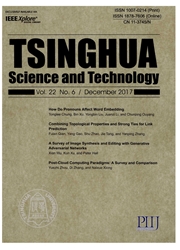

 中文摘要:
中文摘要:
Collaborative Filtering (CF) is a commonly used technique in recommendation systems. It can promote items of interest to a target user from a large selection of available items. It is divided into two broad classes: memory-based algorithms and model-based algorithms. The latter requires some time to build a model but recommends online items quickly, while the former is time-consuming but does not require pre-building time. Considering the shortcomings of the two types of algorithms, we propose a novel Community-based User domain Collaborative Recommendation Algorithm (CUCRA). The idea comes from the fact that recommendations are usually made by users with similar preferences. The first step is to build a user-user social network based on users’ preference data. The second step is to find communities with similar user preferences using a community detective algorithm. Finally, items are recommended to users by applying collaborative filtering on communities. Because we recommend items to users in communities instead of to an entire social network, the method has perfect online performance. Applying this method to a collaborative tagging system, experimental results show that the recommendation accuracy of CUCRA is relatively good, and the online time-complexity reduces to O.n/.
 英文摘要:
英文摘要:
Collaborative Filtering (CF) is a commonly used technique in recommendation systems. It can promote items of interest to a target user from a large selection of available items. It is divided into two broad classes: memory-based algorithms and model-based algorithms. The latter requires some time to build a model but recommends online items quickly, while the former is time-consuming but does not require pre-building time. Considering the shortcomings of the two types of algorithms, we propose a novel Community-based User domain Collaborative Recommendation Algorithm (CUCRA). The idea comes from the fact that recommendations are usually made by users with similar preferences. The first step is to build a user-user social network based on users' preference data. The second step is to find communities with similar user preferences using a community detective algorithm. Finally, items are recommended to users by applying collaborative filtering on communities. Because we recommend items to users in communities instead of to an entire social network, the method has perfect online performance. Applying this method to a collaborative tagging system, experimental results show that the recommendation accuracy of CUCRA is relatively good, and the online time-complexity reduces to O.(n).
 同期刊论文项目
同期刊论文项目
 同项目期刊论文
同项目期刊论文
 期刊信息
期刊信息
